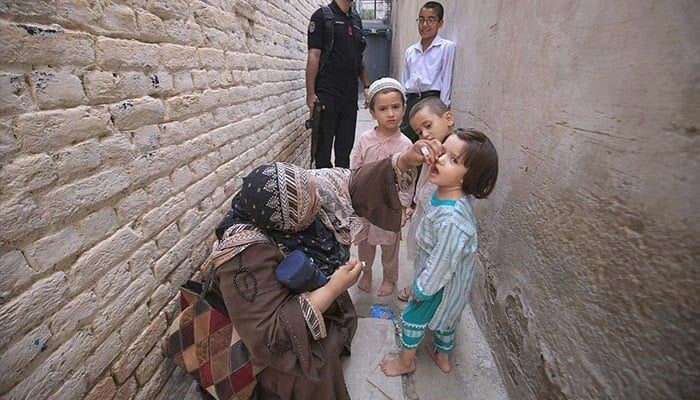Govt to launch nationwide anti-polio drive in three provinces on Sept 1
NEOC postpones polio vaccination campaign in nine districts of Punjab due to floods
August 30, 2025

- Pakistan reports 26 polio cases this year.
- Most cases reported from Khyber Pakhtunkhwa.
- Polio virus detected in sewage samples of 127 districts.
Pakistan will launch new nationwide anti-polio campaign on September 1 in three provinces, while in Punjab, the campaign will start on September 10.
Federal Minister for National Health Services, Regulations and Coordination Syed Mustafa Kamal, accompanied by MQM-Pakistan leader Anis Qaimkhani, held a press conference at his camp office in Karachi on Friday regarding the upcoming nationwide polio Campaign and flood situation in Pakistan.
Addressing the presser, he said that the polio virus has been detected in sewage samples of 127 districts across the country, including all districts of Karachi.
He stated that out of the 26 reported cases this year, 16 were from Khyber Pakhtunkhwa, with 13 cases emerging from southern KP where security challenges had hindered vaccination efforts.
Meanwhile, the National Emergency Operations Centre (NEOC) has postponed the polio vaccination campaign in nine districts of Punjab due to the ongoing flood situation.
The campaign has been postponed in Lahore, Sheikhupura, Kasur, Okara, Gujranwala, Sialkot, Multan, Muzaffargarh, and Bahawalpur. Meanwhile, the polio drive will continue as scheduled in Rawalpindi, Mianwali, Faisalabad, and Dera Ghazi Khan.
In Attock, Rajanpur, and Rahim Yar Khan, the vaccination campaign will proceed as planned.
Highlighting the gravity of the situation, Kamal said: “The only solution to protect children from polio is repeated administration of polio drops. All religious scholars and madrasas have declared the vaccine safe, and we must depoliticise the fight against polio. Afghanistan and Pakistan are conducting synchronised polio drives, and with joint efforts, we will soon rid the country of this crippling disease.”
The health minister further stressed that parents in Karachi show the highest resistance to polio vaccination. He noted that door-to-door campaigns are underway across Pakistan.
Turning to the flood situation in the country, Kamal said the government has responded to all demands for medicines and medical equipment from flood-affected areas. He stated that federal and provincial governments are in constant coordination, while a Command and Control Room has been established at the National Institute of Health (NIH) to monitor the situation. He added that NDMA teams are in close contact with the Ministry of Health.
Kamal emphasised that natural disasters cannot be tackled by provincial or federal governments alone, and called for strengthening of the local government system, which he termed the most effective mechanism for disaster management.
“Our country is functioning under provincial and federal structures, but disasters of such magnitude cannot be managed without empowered local bodies. We need administrative reforms and creation of new units on administrative grounds, not to divide the country but to strengthen governance and ensure delivery at the grassroots level.”
The minister added that while the provinces received Rs 8,700 billion collectively, there is no mechanism to ensure that resources trickle down to the lowest tier. He called for transparent planning and effective utilisation of funds.











